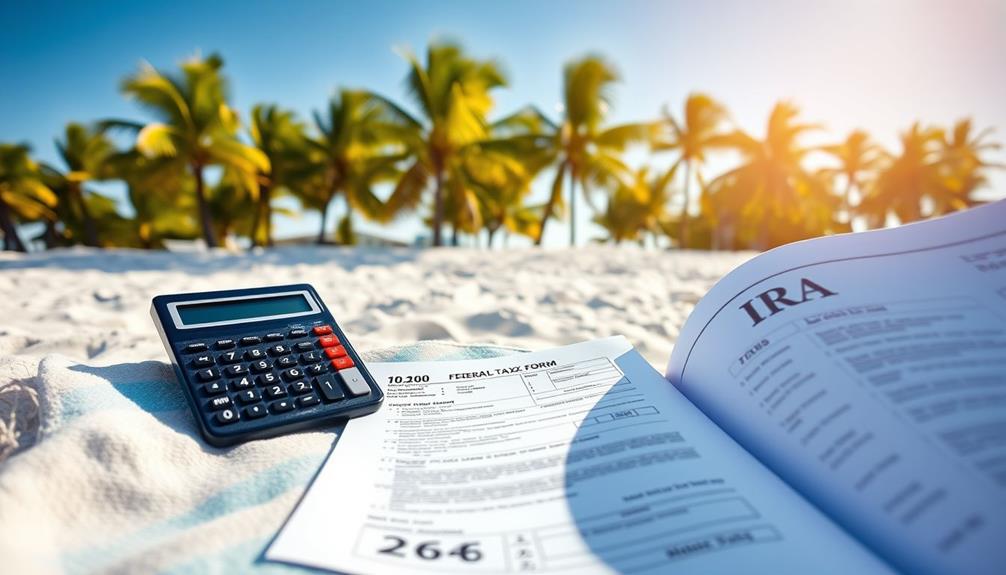In the state of Florida, you do not have to worry about paying state taxes on your IRA withdrawals, which can simplify your retirement spending. All types of retirement income, including pensions and Social Security benefits, are not subject to state taxes. However, it is important to remember that federal taxes still apply based on your tax bracket. If you are under 59 1/2 and withdraw funds early, you may be subject to a federal penalty. Strategic timing of your withdrawals can help you effectively manage your income and federal tax liabilities. Having a good grasp of these factors can significantly benefit your financial planning. There is a lot more to discover about optimizing your retirement finances in this tax-friendly state.
Key Takeaways
- Florida has no state income tax, making IRA withdrawals tax-free at the state level for retirees.
- All retirement income, including IRA withdrawals, pensions, and Social Security, is exempt from Florida state taxation.
- There are no estate or inheritance taxes in Florida, facilitating wealth transfer without additional tax costs.
- Moderate property tax rates and a 6% sales tax contribute to Florida's overall favorable tax climate for retirees.
- Federal tax rules still apply to IRA withdrawals, including income tax brackets and penalties for early withdrawals.
Florida's No State Income Tax

Florida's no state income tax creates a significant advantage for retirees looking to withdraw funds from their IRAs. This means that when you take distributions from your retirement accounts, you won't face any state tax liabilities, allowing you to keep more of your hard-earned money.
All forms of retirement income, including IRA withdrawals and 401(k) distributions, are tax-free at the state level in Florida, which can be a game-changer for your financial planning. Additionally, investing in assets like gold through Gold IRAs can provide long-term capital appreciation and act as a safe haven during economic downturns.
This tax-friendly environment attracts many retirees like you, enabling you to maximize your retirement savings without worrying about state tax deductions on your withdrawals. With the cost of living often a concern, this aspect of Florida's tax structure provides much-needed financial relief.
However, it's essential to remember that federal taxes still apply to IRA withdrawals. You'll need to take into account your federal tax bracket when planning distributions to avoid any surprises during tax season.
Federal Tax on IRA Withdrawals

When you withdraw money from your IRA, you'll face federal income tax based on your tax bracket.
If you're under 59½, you could be hit with a 10% early withdrawal penalty, adding to your tax burden.
Additionally, it's essential to take into account the potential for higher returns with gold as a long-term investment, especially if you've rolled over funds from a 401k to a Gold IRA diversification of retirement portfolio.
Plus, remember that Required Minimum Distributions kick in at age 72, and missing these can lead to hefty penalties as well.
Federal Tax Rates
Understanding the federal tax implications of IRA withdrawals is essential for effective retirement planning. When you take withdrawals from traditional IRAs, these amounts become fully taxable as ordinary income in the year you withdraw them. This can greatly impact your taxable income and may increase your tax liability, pushing you into a higher tax bracket.
As of 2023, federal tax rates range from 10% to 37%, so timing your retirement distributions can be vital. Additionally, considering alternative investment options like a Gold IRA can provide tax benefits and potential growth.
If you're over 72, remember that required minimum distributions (RMDs) are mandatory, and failing to withdraw the required amount can lead to a hefty 50% penalty on the shortfall.
On the other hand, Roth IRA withdrawals can be tax-free at the federal level if your account has been open for at least five years and you're at least 59½ years old.
Early Withdrawal Penalties
Taking early withdrawals from your IRA can lead to additional financial burdens beyond just federal income tax. If you're under age 59½, you may face a 10% federal early withdrawal penalty on your IRA distributions, which is added to your regular income tax. This means that what you thought would be a simple boost to your retirement income could actually take a significant chunk out of it.
However, you can avoid this penalty if your withdrawal is for qualified expenses, such as unreimbursed medical costs, disability, or higher education.
For those aged 59½ to 70½, you can take IRA withdrawals without incurring the early withdrawal penalty, but you still owe regular income tax on the amount.
Once you reach age 70½, you must begin taking required minimum distributions (RMDs), or you risk a hefty 50% penalty on the amount you should have withdrawn.
Additionally, understanding how these withdrawals affect your overall tax situation, including state taxes in Florida, is essential. Be mindful of how your IRA decisions can influence your Social Security benefits and overall retirement strategy.
Required Minimum Distributions
Maneuvering Required Minimum Distributions (RMDs) can be a complex but essential part of managing your retirement funds. In Florida, you must start taking RMDs from your IRAs by April 1 of the year following your 72nd birthday. If you don't, you could face a hefty 50% penalty on the amount you should've withdrawn.
The IRS calculates RMD amounts by dividing your account balance at the end of the previous year by a life expectancy factor from the IRS Uniform Lifetime Table. It's important to remember that RMDs count as ordinary income, which means they can push you into higher federal tax brackets, making your retirement income taxable.
While you can withdraw more than the RMD amount, the additional funds are still subject to federal income tax. Plus, if you fail to take the full RMD, the penalties can be severe, emphasizing the importance of compliance.
Keep in mind that Social Security benefits could also be impacted by your overall income level, so it's wise to plan your withdrawals carefully to avoid unnecessary tax burdens and penalties.
Types of Retirement Income in Florida

In Florida, you can enjoy tax-free retirement income, which includes Social Security benefits, IRA withdrawals, and pension payments.
This means you won't have to worry about state income tax eating into your savings.
With such favorable tax treatment, Florida stands out as a great place for retirees to maximize their income.
Tax-Free Retirement Income
Retirees in Florida often enjoy a considerable financial advantage thanks to the state's tax-free treatment of various forms of retirement income. Unlike many other states, Florida doesn't impose a state income tax on your retirement income, including withdrawals from retirement accounts like IRAs and 401(k) plans. This means you can access your savings without worrying about additional tax liabilities, allowing you to maximize your financial resources.
Social Security benefits are also exempt from state taxation, allowing you to keep more of your hard-earned money. This tax-free retirement income considerably enhances your financial situation compared to states that do tax retirement income.
Additionally, Florida's absence of inheritance or estate taxes means you can pass on your wealth without incurring extra costs. While Florida does have moderate property tax rates, the overall tax structure remains favorable for retirees.
The lack of state income tax coupled with relatively low property taxes makes Florida an attractive destination for those seeking a comfortable retirement. By understanding these tax advantages, you can better plan your withdrawals and enjoy your retirement years to the fullest.
Social Security Benefits Exemption
Many people find that Social Security benefits in Florida provide a significant financial boost during retirement, as these benefits aren't subject to state taxation. This exemption allows you to retain the full amount of your benefits, making it easier to manage your income during your golden years. Florida stands out as one of the most tax-friendly states for retirees, especially when you consider that all forms of retirement income—like pensions, IRA distributions, and 401(k) withdrawals—are also exempt from state taxes.
Here's a quick overview of retirement income tax implications in Florida:
| Type of Income | Subject to State Tax? | Estate Taxes? |
|---|---|---|
| Social Security | No | No |
| Pensions | No | No |
| IRA Distributions | No | No |
With about 20% of Florida's population aged 65 and older, it's clear that retirees are drawn to the state's favorable tax environment. The absence of estate taxes further enhances wealth preservation, allowing you to enjoy your retirement income without the burden of additional taxes.
IRA and Pension Withdrawals
Florida's tax-friendly environment extends beyond Social Security benefits to include all types of retirement income, such as IRA and pension withdrawals. In Florida, retirees like you can breathe easy knowing that all your retirement income, including IRA withdrawals and pensions, isn't subject to state income tax.
This unique advantage allows you to access your savings without worrying about state tax implications, unlike in many other states.
With no state tax on 401(k) distributions, you can tap into your retirement funds freely. This means you get to keep more of your hard-earned savings, enhancing your overall financial well-being.
The absence of state income tax on these income sources provides significant financial relief, especially for retirees who rely heavily on their pensions and IRA withdrawals for their day-to-day expenses.
Florida's favorable tax structure attracts many retirees looking for a place where they can enjoy their retirement without the burden of state taxes on their income.
Ultimately, knowing that your retirement income is protected from state income tax allows you to plan your future with confidence and peace of mind.
Planning IRA Withdrawals Strategically

When it comes to withdrawing from your IRA, strategic timing can greatly impact your overall tax liability. In Florida, you don't have to worry about state income tax on your IRA withdrawals, which means you keep your full distribution amount.
However, federal tax obligations still apply, so it's crucial to plan your withdrawals carefully. Consider withdrawing funds during years when your overall income is lower. This approach helps minimize the impact on your federal tax bracket and can greatly enhance your retirement income.
Remember, Required Minimum Distributions (RMDs) kick in after age 70½, so planning ahead will guarantee you're compliant while managing the tax implications effectively.
Using a tax advisor can be invaluable in this process. They can help you devise a withdrawal strategy that takes full advantage of Florida's tax-friendly environment while maneuvering through federal tax rules.
Benefits of Florida's Tax Structure

While retirees often seek states with favorable tax conditions, Florida stands out for its unique benefits.
One of the most attractive features of Florida's tax structure is the absence of a personal income tax. This means you can make IRA withdrawals without worrying about state tax liabilities, allowing you to keep more of your hard-earned savings. Additionally, withdrawals from pensions and 401(k) plans are fully exempt from state taxation, making Florida a prime destination for retirement.
Social Security benefits also enjoy tax-free status at the state level, enhancing your financial situation even further. Plus, Florida doesn't impose estate or inheritance taxes, allowing you to pass on your wealth to your heirs without additional burdens.
The overall moderate sales tax rate of 6% and an average property tax rate of just 0.91% contribute to a tax-friendly environment that helps you stretch your retirement income.
With these advantages, Florida truly offers a compelling case for retirees looking to maximize their financial wellbeing while enjoying their golden years.
Impact on Social Security Benefits

Many retirees appreciate that Social Security benefits in Florida aren't subject to state income tax, allowing you to retain the full amount of your benefits.
This tax-free status means that your retirement income remains largely untouched by state levies, creating a more favorable financial environment. When you make IRA withdrawals, you don't have to worry about state tax liabilities impacting your Social Security benefits, as Florida imposes no state income tax on retirement income.
However, it's essential to understand that while Florida doesn't tax your benefits, federal tax rules still apply. If your combined income exceeds $25,000 for single filers or $32,000 for joint filers, up to 85% of your Social Security benefits can become taxable at the federal level.
Nonetheless, the absence of state income tax in Florida can lead to significant tax savings when compared to states with higher income tax rates.
Resources for Retirement Tax Planning

Numerous resources are available to help retirees in Florida effectively plan for retirement taxes. Since Florida doesn't impose a personal income tax, you can access your retirement income, including IRA withdrawals, without worrying about state-level taxation.
This tax-friendly environment allows you to keep more of your hard-earned savings.
One excellent resource is the AARP Foundation Tax-Aide program, which offers free tax assistance for individuals over 50. This program focuses specifically on retirement-related tax planning, helping you navigate any complexities that may arise.
Additionally, you can find various financial planning resources online, including matching tools to connect you with qualified advisors who can guide you in developing effective tax strategies.
Don't overlook the importance of staying informed about Florida's property tax exemptions, such as the Homestead exemption. Utilizing these exemptions can further enhance your financial planning, allowing you to maximize your savings in retirement.
Frequently Asked Questions
Do You Pay Taxes on IRA Withdrawals in Florida?
You won't pay state taxes on IRA withdrawals in Florida since there's no personal income tax. However, keep in mind that federal taxes may still apply, so plan your withdrawals wisely to minimize your overall tax burden.
Do You Pay State Taxes on IRA Withdrawals?
When you dip into your IRA, you won't face any state tax burdens. Florida lets you enjoy your hard-earned savings without that extra weight, allowing you to focus on what truly matters in retirement.
What Are the Tax Implications of Withdrawing From an Ira?
When you withdraw from an IRA, federal taxes apply based on your income. If you're under 59½, expect a 10% penalty. After 72, you'll need to take required minimum distributions to avoid hefty penalties.
How Much Do Seniors Pay Taxes on IRA Withdrawals?
When you withdraw from your IRA, you'll pay federal taxes based on your tax bracket. Seniors must also consider how these withdrawals can affect other income sources, like Social Security benefits. Plan wisely!
Conclusion
So, while you might think you'd dodge taxes entirely in Florida, remember that the federal government still wants its cut on IRA withdrawals. But hey, at least you won't be dealing with state income tax headaches! By planning your withdrawals wisely, you can maximize your retirement income and keep more in your pocket. Embracing Florida's tax-friendly environment is a smart move—just don't forget about Uncle Sam waiting in the wings. Happy planning!









